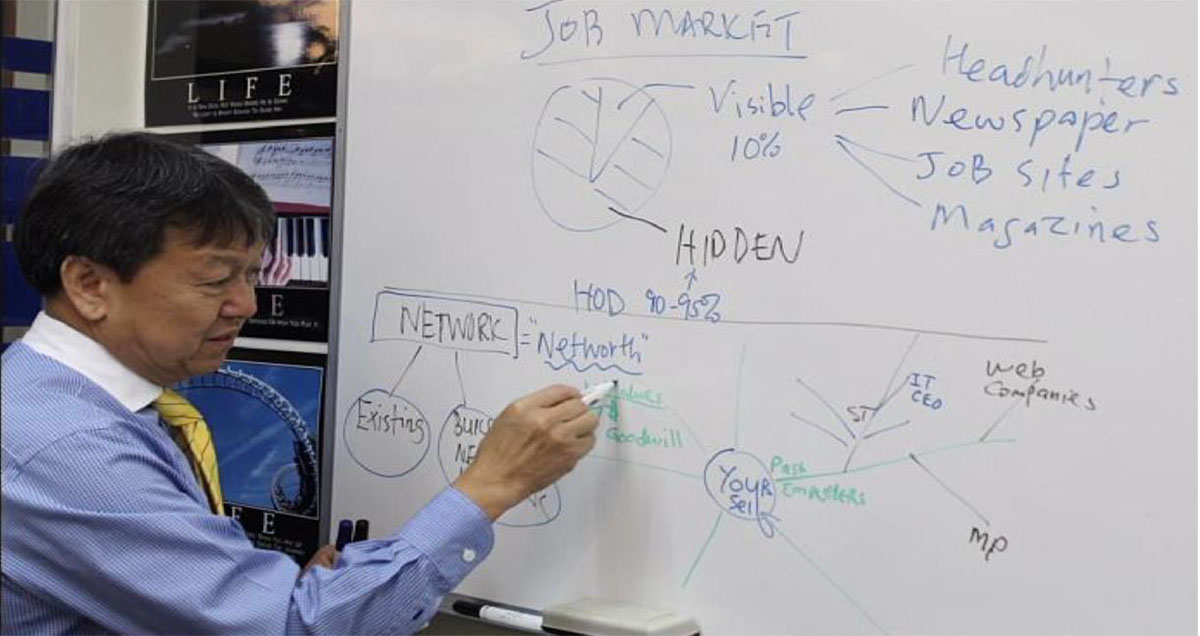Harold’s networking secrets to land the job you want

Managing Principal Coach, Harold Kwan explaining the networking approach to the hidden job market
THE SECRET of career success is knowing people who are in the know about job openings that are not visible in the open market.
This kind of people-connection helps you sniff out a desirable job that you won’t find advertised in the papers or online job sites, says Harold Kwan, who has been sharing with students and business clients the techniques and practice of networking as part of his human resource consultancy.
To be successful in finding such “hidden” jobs, you need to understand and practise correct networking. It requires a deliberate and long-term approach, according to Harold, who points out that contrary to popular belief, you don’t simply walk into a social gathering, exchange name cards and then expect people to call you with available jobs.
“Networking is about giving, not taking,” Harold stresses. We are not suggesting bribes. Rather it is about offering time and been helpful to others, such as providing useful information, referring people to contacts, giving someone a ride, and sharing experiences at relevant events. These meaningful assistance to others makes a high “networking” worth.
Networking worth – a pun on nett worth – is Harold’s concept of how much an individual is worth in terms of friendship and professional contact. New graduates and young people with not many years of work should seriously develop their networking worth by establishing a reputation for being competent, friendly and helpful, not just among co-workers, but also in their professional and social circle.
Developing yourself as human capital
This is how Harold defines “human capital”, the kind of person who is considered an asset anywhere he or she works. “Bosses can’t run their business or organisation without human capital, no matter how good their technology and products are,” he explains.
“So, if you are perceived as human capital or human talent, employers want you!”
Being employable is a D-I-Y project
Harold warns that the traditional job where you work in a contented long-term environment is no longer true. “There’s a lot of cost pressure. To remain competitive, companies are constantly pressurised to manage cost, and sometime result in downsizing or rightsizing exercises where employees at all levels lose their jobs. ‘Employee’ is an obsolete word. For you to survive in this tough environment, you should think of yourself as a ‘sole proprietor’, someone who assumes responsibility to upgrade himself, to keep himself well-informed, to remain fit, so that he is always relevant, ready and useful to the company. In this respect, life is a do-it-yourself or D-I-Y project where you constantly add value to your well-being and skills set.
“The good news is, as long as you are seen to have value, you can get employment and stay employed. So, bear in mind that DIY means to constantly make yourself employable.”
Here’re some tips from Harold for workers of all ages:
- In your resume or “proposal”, do include words like “job target”, “achievements”, “personal attributes”. These expressions are music to recruiters. But do not sell what you don’t have. Do avoid writing a job description detailing your past duties and responsibilities in resumes!
- Do not burn bridges. If you spend 30 percent of a job interview complaining about a former boss, you’re not doing yourself a favour.
- To stay relevant and meet more people, do read widely, attend conferences, trade fairs, exhibitions and job fairs; if possible, contribute articles, teach and speak at selected conferences.
- Having done sufficient research on companies with potential positions that may meet your needs, do consider sending unsolicited proposals (to market yourself) to companies and organisations that you would like to work in. Many openings, especially in larger firms, are not advertised. Some bosses may not even be aware that they need someone with a certain skill set until they read your application letter! Remember, it’s D-I-Y or do-it-yourself. You have to take the initiative to keep current and prospective bosses informed about your talent and availability, even when they are not officially hiring.
- Consider short-term jobs as a long-term career. What this means is that you take on a series of short-term, one-off jobs or projects for most of your life.
This is an edited article that was first posted in SIM Global Education website in August 2013.
Harold Kwan is the Founder and Managing Principal of HK3 Asia Pte Ltd. HK3 Asia help individuals to have more successful careers. We help executives to become successful leaders. We partner organizations and management teams to build clear vision, mission, strategies, structures, teams, goals and plans to bring companies from point A to a desired future state. If you wish to find out more, please call Harold at +65-96397520 or drop us a line to harold@haroldkwan3.com.
